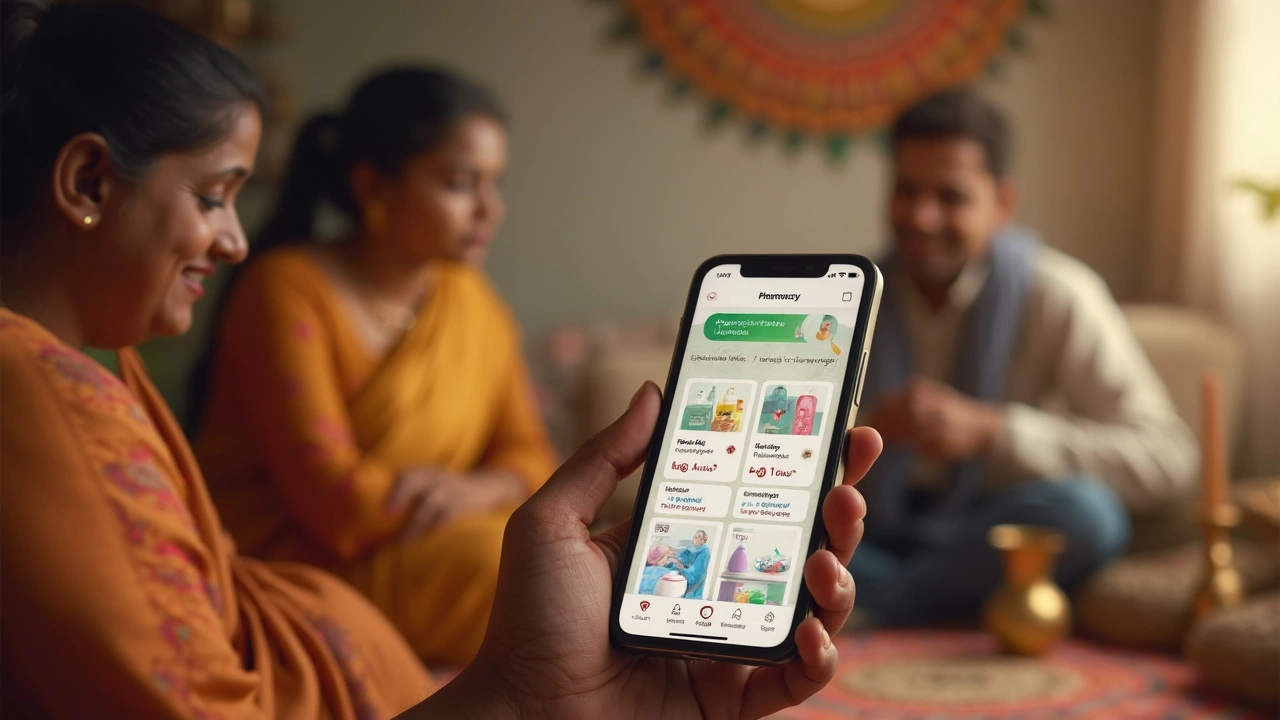These days, ordering medications online is as simple as clicking a button. The convenience of online pharmacies is undeniable—you can dodge long queues and get your meds delivered right to your doorstep. Sounds like a dream, right? But hang on a minute. There are risks that can turn this convenience into a nightmare. We're talking about counterfeit drugs, sketchy websites, and privacy breaches. It's like the wild west out there.
Imagine you're ordering what you think is a painkiller, but what you actually get is a sugar pill, or worse, something harmful. Scary, isn't it? This stuff happens more often than we'd like to admit. So, how do you make sure you're not getting duped? How do you know the pharmacy you're dealing with is genuine? Let’s explore these questions to keep you and your family safe.
- The Convenience and its Catch
- Spotting Fake Medications
- The Issue of Unverified Pharmacies
- Data Privacy Concerns
- Finding Safe Online Pharmacies
- Practical Tips for Online Medication Purchases
The Convenience and its Catch
Ordering meds online feels almost like magic sometimes. Have a headache at 2 AM? No problem, just find an online pharmacy, place your order, and your headache relief is on its way. No need to leave the house or wait till morning. But this dreamy convenience comes with hidden risks that can be more than what you bargained for.
One of the biggest perks is accessibility. For people in remote areas or for those with mobility issues, online pharmacies open up a world of options. Plus, you can compare prices without hopping from store to store, potentially saving a bit of cash. And let’s not forget the anonymity factor. Some folks prefer to keep their health matters private, and ordering online helps with that.
But here's the catch—this convenience can be a bit like playing with fire if you're not careful. With a surge of unverified pharmacies online, it's all too easy to fall for a scam. Not all websites have that pharmacy license they need, and some are just plain fraudulent. They might sell medications that are expired, incorrectly dosed, or even fake.
This isn’t just something from a detective novel. The World Health Organization estimates that about 1 in 10 medical products in low and middle-income countries are substandard or falsified. While that's a global stat, it gives you an idea of the scale of the problem. When you’re ordering health essentials, that's not a roll of the dice you want to take.
The ease of entering your credit card info online also shares its dark side—data privacy risks. Imagine your personal and financial details being compromised because a site wasn't secure. Scary, right? Not how you want to spend your afternoon—chatting with a bank's fraud department.
So, yeah, while online pharmacies offer a lot of conveniences, they also ask you to be extra vigilant. Knowing the red flags to watch for and doing a bit of background research can make all the difference between a seamless experience and a potential health hazard.
Spotting Fake Medications
Alright, let's get down to business. Knowing how to spot fake medications when buying from online pharmacies can literally save your life. Counterfeit drugs are sneaky little devils that try to pass off as the real deal but are often loaded with harmful substances or nothing at all. So, how do you spot these phonies?
First off, pay attention to the packaging. If the medication shows up in a container that looks tampered with or different than what you're used to, that’s a red flag. Legit medicines usually have professionally sealed packaging with clear and accurate information about the drug.
Now, check the labeling. Mistakes in spellings, weird fonts, or missing details like the dosage or expiry date can be big clues. Genuine pharmacies ensure their product information is crystal clear because, well, people's health is on the line!
Another tip is to maintain a skeptical eye on pricing. If it feels like you’re getting your regular diabetes medication at a jaw-dropping discount, there might be a catch. Prices that are too good to be true often are. Legitimate pharmacies can't afford to massively undercut their prices due to fixed costs.
Lastly, there's the pill itself. Counterfeit meds might look slightly off in color or size when compared to genuine ones. If you're not sure, you can always cross-check with your local pharmacy or even on the manufacturer's website for images of the actual pills.
If you’re still in doubt, some useful websites help verify drug barcodes and authenticity. A little diligence here can go a long way in ensuring what you’ve bought is safe for consumption.
Remember, with the booming business in online medication, being able to spot a bad apple quickly can save not just money, but potentially a lot of heartache.
The Issue of Unverified Pharmacies
So, you've stumbled upon an online pharmacy with prices that seem too good to be true. Well, they probably are. The internet is flooded with unverified pharmacies, which can be dangerous for a bunch of reasons.
First off, these websites often sell medications that haven't been vetted by health authorities. What does that mean for you? It means those drugs could be counterfeit, expired, or worse, completely fake. Not exactly what you want when you're trying to manage your health.
The sketchy part isn't just about the meds. A lot of these unverified sites look legit but don’t require a prescription. If a site offers to sell you medications without one, that's a massive red flag. Legitimate pharmacies, whether online or brick-and-mortar, follow strict regulations, including asking for a doctor's prescription.
Not convinced yet? Let's look at some eye-opening numbers. According to a 2024 study, nearly 96% of online pharmacies were operating illegally, shocking, right? This includes everything from selling unauthorized drugs to compromising customer data. Think about your personal info, like your name, address, and credit card details, being in the hands of some digital bandits. Yikes!
Okay, so how can you separate the good apples from the bad ones? Look out for certification marks from authority bodies like the NABP or your country's version of a pharmacy board. And remember, if you’re unsure, a quick Google search can save you a lot of trouble.
So next time you're tempted by that unreal discount or speedy delivery promise, pause and think. Safety over savings, any day.

Data Privacy Concerns
Online pharmacies might make life easier, but they also come with a big question mark when it comes to data privacy. You're trusting them with your medical info, credit card details, and home address. Sounds like handing over your diary to a stranger, doesn't it? This sensitive data is a goldmine for hackers if it's not well-protected.
So, what's the real deal here? Many online pharmacies profess to protect your info, but not all have rock-solid privacy policies. In 2023, a study found that nearly 60% of online pharmacies lacked adequate SSL certificate—a basic security feature for encrypting transactions. Without it, your details could be flying around unprotected in cyberspace.
And then there's the worry of data being sold. You ever wondered about those annoying targeted ads? Yep, that's companies selling your data to third parties. With your health info in the mix, it gets way more personal. So, it’s vital to check a pharmacy’s privacy policy to see what they’re doing with your information.
- Look for indicators like HTTPS in the URL, showing the site is secure.
- Read reviews. Previous users can spill the beans about privacy breaches.
- Avoid pharmacies that ask for too much unnecessary info.
Keeping your data safe while buying meds online is crucial, not just for peace of mind, but to avoid identity theft or fraud. So, if a pharmacy isn’t transparent about how they handle your data, it’s a red flag you can’t ignore.
Finding Safe Online Pharmacies
So you’re ready to jump into the world of online pharmacies but feeling a bit cautious? Smart move. Safety first, right? The good news is, there are ways to make sure you're dealing with the real deal when it comes to buying meds online.
First off, check for certification. In many countries, legitimate online pharmacies will have some accreditation like the Verified Internet Pharmacy Practice Sites (VIPPS) seal in the U.S. or equivalent local bodies elsewhere. These certifications are a big green light that the pharmacy meets quality standards.
Another solid tip is to see if the website asks for a prescription. Yup, a legit pharmacy will always require one. If they're cool with selling you prescription drugs without a prescription, that's a red flag waving.
According to the National Association of Boards of Pharmacy, "95% of online pharmacies are operating illegally."
- Do a background check: Take a look at the pharmacy's contact information. Can you find a phone number and address? Red flags go off when there’s no way to reach them other than an email.
- Peek at reviews: Customer feedback can be incredibly telling. If people have had dodgy experiences, they’re bound to speak up.
Also, take note of their prices. Deals too good to be true? Probably fake or low-quality products. Scammers often lure consumers with rock-bottom prices that can be hard to resist.
If you’re wondering about data safety when using online pharmacies, you should check for a privacy policy outlining how your info is protected. A trusty site will clearly state its commitment to safeguarding your data.
So, in a nutshell, doing your homework can spare you a lot of headaches and ensure the medications you order are safe and effective. Happy browsing and stay sharp!
Practical Tips for Online Medication Purchases
Alright, so you're set on buying meds online. How do you do it safely without falling into any traps? Here are some straightforward tips to keep in mind.
First things first, always look for licensed online pharmacies. Do they have a physical address? Are they verified by your country's health authority? It's rare, but some pharmacy boards will have a verification tool on their website. If it's way too cheap compared to local pharmacies, it's probably a red flag.
- Check for Certification: Look for a seal of approval, like Verified Internet Pharmacy Practice Sites (VIPPS) if you're in the US. These certifications mean they're playing by the rules.
- Doctor's Prescription: Legit websites will always ask for a prescription. If they don't, it's time to hit that back button!
- Secure Payment: Ensure the website uses secure payment methods. Look for 'https' in the URL where the 's' stands for secure. Avoid any site that looks sketchy or lacks basic security measures.
- Contact Information: Easy access to customer service is vital. An online pharmacy that doesn’t provide contact info or dodges inquiries is a no-go.
Being cautious about data privacy is a must. Your health info is super personal, and you don't want it landing in the wrong hands. Look for a privacy policy page to understand how they handle your data.
| Risk | Prevention Tip |
|---|---|
| Counterfeit Medications | Verify legitimacy through certification |
| Data Breaches | Ensure the site has SSL encryption |
| Receiving Wrong/Expired Drugs | Only purchase from known and reviewed companies |
Lastly, community feedback helps! If people are complaining online about a certain pharmacy, there's usually truth to their claims. Check reviews and forums. At the end of the day, a bit of research goes a long way in making sure you’re not just burning money, but getting what you need safely.
